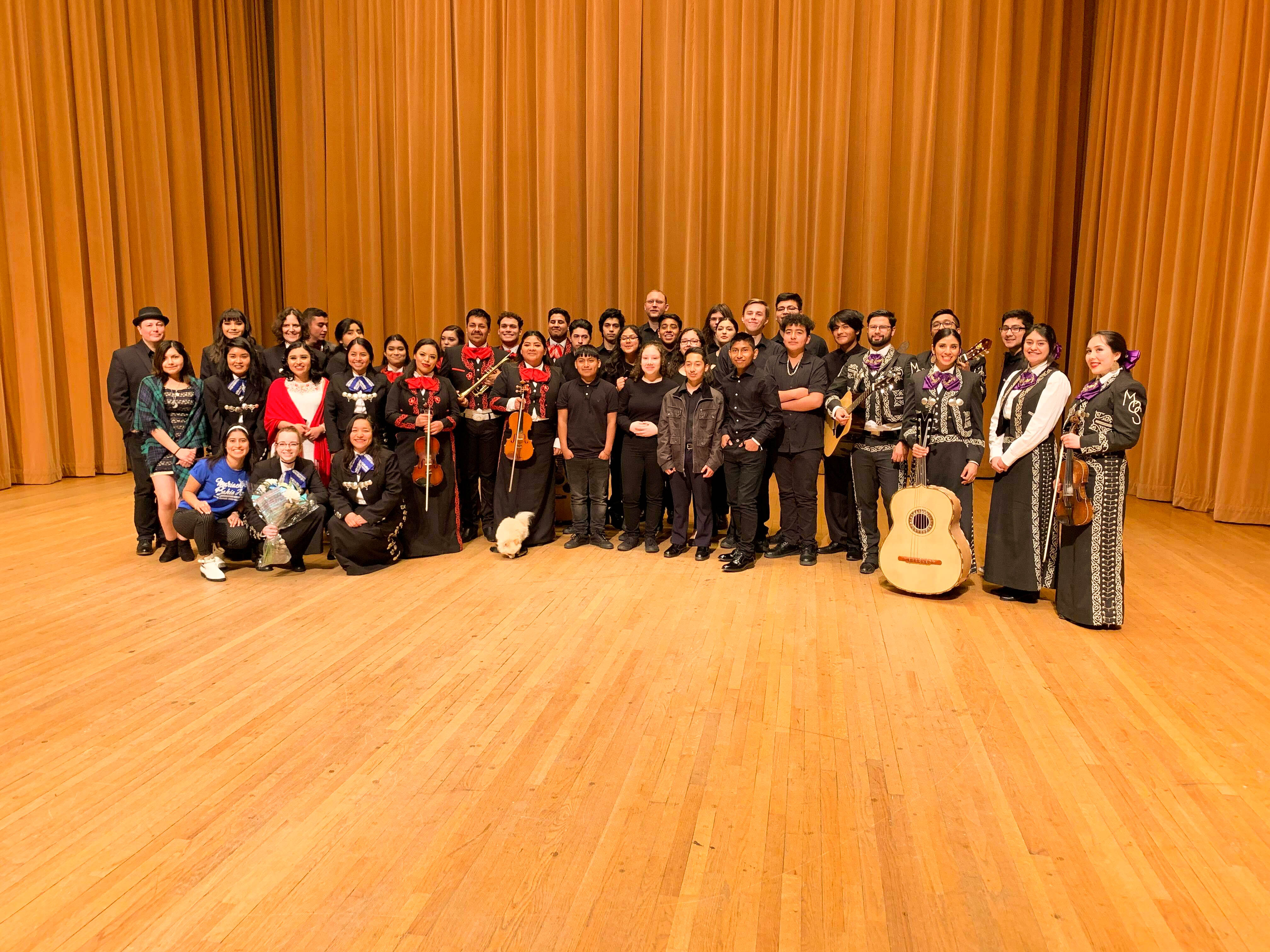2019 Mariachi Conference musicians pose of a group picture after a night full of music in the PAC on April 14. Mariachi groups include Mariachi Bahía Azul de WWU, Mariachi Quinto Sol de UW, Los Tigres de Burlington High School, Juan Galvez and Mariachi del Centro de CWU. MacKenzie Dexter//AS Review
By MacKenzie Dexter
Western hosted the second annual Mariachi Conference at the PAC on April 14. High school and college mariachi groups from across Washington performed and shared their passion for music with students at Western and in Bellingham.
Groups and individuals who performed include Mariachi Bahía Azul de WWU, Mariachi Quinto Sol de UW, Los Tigres de Burlington High School, Juan Galvez and Mariachi del Centro de CWU.
Western’s Mariachi Bahía Azul de WWU hosted the event to show students that mariachi has a connection to education, culture and a safe space. The mariachi groups across Washington bring a range of mariachi levels together for an experience of growth and learning, Jessica Alvaro, manager of Mariachi Bahía Azul de WWU, said.
The conference was designed to show high school students that their dreams of being a mariachi don’t have to end with their high school graduation and that college mariachi programs can be a path to higher education, Alvaro said.
This student-run event, started by Juan Galvez in 2018, was created to connect the community through music. According to Alvaro, they wanted to continue that idea by bringing awareness to Bellingham about traditional mariachi music and culture.
Beatrice Davis, a member of Mariachi Bahía Azul de WWU, said this event is a way to show students all around the state that colleges have mariachi programs and how it can connect them to higher education through college mariachi programs as well as student resources on campuses.
“We are letting the community know that we are here and we are here to support them and there is a place for them here,” Davis said.
Alvaro’s goal for the conference was to make sure that students know there is a place for them here at Western. She also wants people to know that Mariachi Bahía Azul de WWU, are here for everyone in the community and that they are encouraged to be part of this event and experience.
“Mariachi is open to the public to join because we want to make that connection,” Alvaro said. “It connects us all across Washington and connects each individual school to the Latinx population together while we are in a predominantly white area.”
Workshops took place in the Viking Union before the performance for Burlington High School students. Patrick Freeland held a workshop for first-generation students, to help students build connections, seek support and gives an overview of Western’s services. Another the workshop, Latinx Representation and Mexican-centris held by Joselyn Chavez, discussed Mexican-centrism and how it is shown in media, academic, etc. The workshop also discussed what it meant to be Latinx and rethinking Latinidad.
Alvaro and Davis, along with help from others, spent several months preparing for the event and workshops, as well as contacting schools across the state. Alvaro said that it took the entire community to make this event happen. The conference also received help from Western’s Student Outreach Services, Leonard Jones Foundation, Department of Sociology, Music Department and Office of Admissions.
Alvaro described how being the manager of Mariachi Bahía Azul de WWU has influenced and pushed her during her time at Western. She explained it helped her connect to her roots as well as find a community at Western.
“Without the community, this would not be possible, and only through community can we continue this cultural experience,” Alvaro said. “We have a responsibility to continue providing this experience to future generations.”
Individuals who attended the conference also explained the importance of this event to students attending schools around Washington.
“As a musician myself, one of the things that I’ve learned is that no matter where you are in the world, no matter what socio-economic status you come from, music is one of the best connecting mediums for intersectionality,” Abu Naimzadeh, conference attendee and Western student, said.

